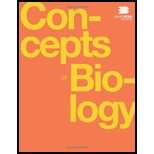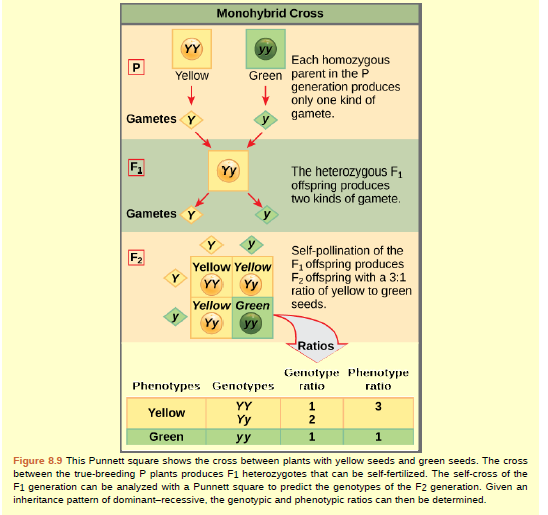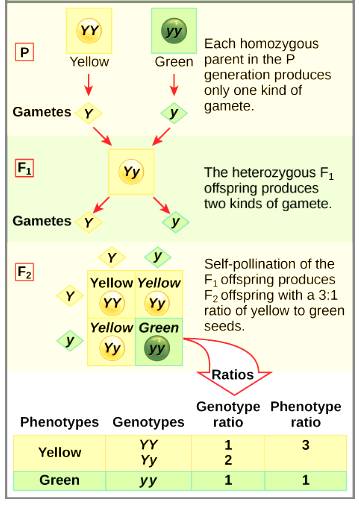
Concept explainers
Figure 8.9 In pea plants, round peas (R) are dominant to wrinkled peas (r). You do a test cross between a pea plant with wrinkled peas (genotype rr) and a plant of unknown genotype that has round peas. You end up with three plants, all which have round peas. From this data, can you tell if the parent plant is homozygous dominant or heterozygous?

To analyze:
If the parent plant is homozygous dominant or heterozygous.
Introduction:
An organism is known as homozygous dominant when it carries two copies of same dominant allele and when it carries two copies of the same recessive allele, then it is called as homozygous recessive. In case of heterozygous organisms, two different alleles of a gene are present.
Explanation of Solution
Given:

According to the figure, Punnet square depicts the cross between plants with yellow and green seeds. There is a cross between the true-breeding parent (P) plantswhich produce F1 heterozygotes and are capable of self-fertilization. This self-cross of the F1 generation can be used for analysis with the Punnet square for predicting the genotype of the F2 generation. If the inheritance pattern of the dominant and recessive is provided then, the genotypic and phenotypic ratios can be determined.
Here, the pea plants having round peas(R) are dominant to the wrinkled peas(r). A test cross between a pea plant with the wrinkled peas having genotype (rr) and an unknown genotype having round peas. The progenyhas three plants with round peas. From this data,it cannot be surely concluded if the given plant is homozygous or heterozygous because the data set given is quite small. Due to a random chance, the three plants have acquired the dominant gene only even if the recessive gene is present.
Thus,from this data, we can't conclude if the given plant is homozygous or heterozygous because the data set given is quite small.
Want to see more full solutions like this?
Chapter 8 Solutions
Concepts of Biology
Additional Science Textbook Solutions
Biology: Life on Earth (11th Edition)
Campbell Biology in Focus (2nd Edition)
Concepts of Genetics (12th Edition)
Microbiology with Diseases by Body System (5th Edition)
Human Anatomy & Physiology (2nd Edition)
Campbell Essential Biology (7th Edition)
- Limetown S1E4 Transcript: E n 2025SP-BIO-111-PSNT1: Natu X Natural Selection in insects X + newconnect.mheducation.com/student/todo CA NATURAL SELECTION NATURAL SELECTION IN INSECTS (HARDY-WEINBERG LAW) INTRODUCTION LABORATORY SIMULATION A Lab Data Is this the correct allele frequency? Is this the correct genotype frequency? Is this the correct phenotype frequency? Total 1000 Phenotype Frequency Typica Carbonaria Allele Frequency 9 P 635 823 968 1118 1435 Color Initial Frequency Light 0.25 Dark 0.75 Frequency Gs 0.02 Allele Initial Allele Frequency Gs Allele Frequency d 0.50 0 D 0.50 0 Genotype Frequency Moths Genotype Color Moths Released Initial Frequency Frequency G5 Number of Moths Gs NC - Xarrow_forwardWhich of the following is not a sequence-specific DNA binding protein? 1. the catabolite-activated protein 2. the trp repressor protein 3. the flowering locus C protein 4. the flowering locus D protein 5. GAL4 6. all of the above are sequence-specific DNA binding proteinsarrow_forwardWhich of the following is not a DNA binding protein? 1. the lac repressor protein 2. the catabolite activated protein 3. the trp repressor protein 4. the flowering locus C protein 5. the flowering locus D protein 6. GAL4 7. all of the above are DNA binding proteinsarrow_forward
- What symbolic and cultural behaviors are evident in the archaeological record and associated with Neandertals and anatomically modern humans in Europe beginning around 35,000 yBP (during the Upper Paleolithic)?arrow_forwardDescribe three cranial and postcranial features of Neanderthals skeletons that are likely adaptation to the cold climates of Upper Pleistocene Europe and explain how they are adaptations to a cold climate.arrow_forwardBiology Questionarrow_forward
- ✓ Details Draw a protein that is embedded in a membrane (a transmembrane protein), label the lipid bilayer and the protein. Identify the areas of the lipid bilayer that are hydrophobic and hydrophilic. Draw a membrane with two transporters: a proton pump transporter that uses ATP to generate a proton gradient, and a second transporter that moves glucose by secondary active transport (cartoon-like is ok). It will be important to show protons moving in the correct direction, and that the transporter that is powered by secondary active transport is logically related to the proton pump.arrow_forwarddrawing chemical structure of ATP. please draw in and label whats asked. Thank you.arrow_forwardOutline the negative feedback loop that allows us to maintain a healthy water concentration in our blood. You may use diagram if you wisharrow_forward
- Give examples of fat soluble and non-fat soluble hormonesarrow_forwardJust click view full document and register so you can see the whole document. how do i access this. following from the previous question; https://www.bartleby.com/questions-and-answers/hi-hi-with-this-unit-assessment-psy4406-tp4-report-assessment-material-case-stydu-ms-alecia-moore.-o/5e09906a-5101-4297-a8f7-49449b0bb5a7. on Google this image comes up and i have signed/ payed for the service and unable to access the full document. are you able to copy and past to this response. please see the screenshot from google page. unfortunality its not allowing me attch the image can you please show me the mathmetic calculation/ workout for the reult sectionarrow_forwardIn tabular form, differentiate between reversible and irreversible cell injury.arrow_forward
 Concepts of BiologyBiologyISBN:9781938168116Author:Samantha Fowler, Rebecca Roush, James WisePublisher:OpenStax College
Concepts of BiologyBiologyISBN:9781938168116Author:Samantha Fowler, Rebecca Roush, James WisePublisher:OpenStax College Biology: The Dynamic Science (MindTap Course List)BiologyISBN:9781305389892Author:Peter J. Russell, Paul E. Hertz, Beverly McMillanPublisher:Cengage Learning
Biology: The Dynamic Science (MindTap Course List)BiologyISBN:9781305389892Author:Peter J. Russell, Paul E. Hertz, Beverly McMillanPublisher:Cengage Learning Biology (MindTap Course List)BiologyISBN:9781337392938Author:Eldra Solomon, Charles Martin, Diana W. Martin, Linda R. BergPublisher:Cengage Learning
Biology (MindTap Course List)BiologyISBN:9781337392938Author:Eldra Solomon, Charles Martin, Diana W. Martin, Linda R. BergPublisher:Cengage Learning Human Biology (MindTap Course List)BiologyISBN:9781305112100Author:Cecie Starr, Beverly McMillanPublisher:Cengage Learning
Human Biology (MindTap Course List)BiologyISBN:9781305112100Author:Cecie Starr, Beverly McMillanPublisher:Cengage Learning Human Heredity: Principles and Issues (MindTap Co...BiologyISBN:9781305251052Author:Michael CummingsPublisher:Cengage Learning
Human Heredity: Principles and Issues (MindTap Co...BiologyISBN:9781305251052Author:Michael CummingsPublisher:Cengage Learning Biology 2eBiologyISBN:9781947172517Author:Matthew Douglas, Jung Choi, Mary Ann ClarkPublisher:OpenStax
Biology 2eBiologyISBN:9781947172517Author:Matthew Douglas, Jung Choi, Mary Ann ClarkPublisher:OpenStax





